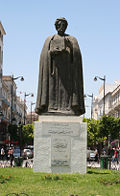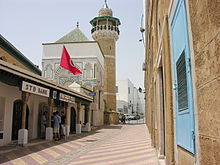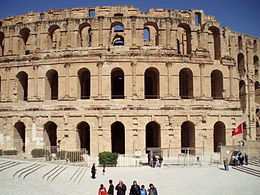- Portal:Tunisia
-
- Wikipedia portals:
- Culture
- Geography
- Health
- History
- Mathematics
- Natural sciences
- People
- Philosophy
- Religion
- Society
- Technology
Tunisia

Tunisia (Arabic: تونس Tūnis), officially the Tunisian Republic (الجمهورية التونسية), is a country situated on the Mediterranean coast of North Africa. It is bordered by Algeria to the west and Libya to the southeast. It is the northernmost African country and the smallest of the nations situated along the Atlas mountain range. Around forty percent of the country is composed of the Sahara desert, with much of the remainder consisting of particularly fertile soil, and a 1300 km coastline.
Tunisia was a major civilization crossing through history; different cultures, civilizations and multiple successive dynasties contributed to the culture of the country over centuries with a varying degrees of influence. Among these cultures were the Punic, Roman, Jewish, Christian, Arab, Islamic, Turkish, and French, in addition to native Berbers. This unique mixture of cultures made Tunisia, with its strategic geographical location in the Mediterranean, the core of some great civilizations of Mare Nostrum first with the famous Phoenician city of Carthage, and later, as the Africa Province, which became known as the bread basket of the Roman Empire.
The history of Tunisia reveals this rich past where different successive Mediterranean cultures had a strong presence. After the Carthaginian Empire, the Roman Empire came and left a lasting effect on the land with various monuments and cities such the El-Jem Amphitheater and the archaeological site of the ancient city of Carthage, which is classified as a world heritage site. El Jem is just one of seven world heritage sites found in Tunisia.
Tunisia ranks high among Arab and African nations. Tunisia is the most competitive and peaceful country in the African content. When it comes to economic competitiveness, Tunisia ranks high even compared to some developed economies such that of Portugal, Italy and Greece.
In the news
Selected biography
Ibn Khaldūn or Ibn Khaldoun (full name, Arabic: أبو زيد عبد الرحمن بن محمد بن خلدون ) (May 27, 1332 AD/732 AH – March 19, 1406 AD/808 AH), was a famous Tunisian scholar. He is considered the forerunner of several social scientific disciplines: demography, historiography, the philosophy of history, sociology and modern economics. He is sometimes considered to be the "father" of these disciplines, or even the founder of social sciences in general for anticipating many elements of these disciplines centuries before they were founded in the West. He is best known for his Muqaddimah (known as Prolegomenon in the West), the first volume of his book on universal history, Kitab al-Ibar. In addition to social sciences, he was an astronomer, Islamic theologian, hafiz, jurist, lawyer, mathematician, military strategist, nutritionist, philosopher and statesman. (more...)Did you know?
- ...that 37% of the Tunisian GDP is invested in education.
- ...that Tunisia is ranked 11 globally in terms of quality of the education system.
- ...that 164 columns in the Zaytuna Mosque were originally taken from the site of Carthage.
- ...that Youssef Dey mosque was the first mosque to be built in Tunis under the Hanafi school. Its minaret (pictured) was also the first to have an octagonal shape in the capital.
- ...that the Tunisian boxer Young Perez, killed on January 22nd 1945 in Gliwice, was the world champion in flyweight between 1931 and 1932.
- ...that in 1930, Tahar Haddad published his book Our Women in the Sharia and Society in which he explained his reform program for the Tunisian society emphasizing on women liberation and rights. At the same time, he showed that Islam basically view that men and women are equal in rights and duties.
- ...that the 1996' movie The English Patient was filmed in south-west Tunisia. The movie won later nine-academy awards, including Best Picture.
Selected picture
El Djem Amphitheater (often incorrectly called "a coliseum") is one of the seven World Heritage Sites found in Tunisia (since 1979). The Amphitheater is capable of seating 35,000 spectators. Only Rome's Colosseum (about 45,000 spectators) and the ruined theater of Capua are larger. The amphitheater at El-Djem was built by the Romans under proconsul Gordian, who was acclaimed Emperor at Thysdrus, around 238 and was probably mainly used for gladiator shows and chariot races (like in Ben-Hur). It is also possible that construction of the amphitheater was never finished.
Categories
Topics
 Tunisia topics
Tunisia topicsHistory Pre-Historic · Punic era · Roman era · Early Islamic era · Medieval era · Ottoman era · French occupation · Modern era · Jewish history · Revolution
Politics Constitution · Political parties · Foreign relations · President · Prime Minister · Cabinet · Chamber of Councillors · Chamber of Deputies · MilitaryGeography Economy Culture Demographics · Education · Religion · Islam in Tunisia · Cuisine of Tunisia · Rugby · Music · Cinema · Tunisian Italians · Les Scouts Tunisiens · Gay rights · Tunisian Arabic · Education: Tunisian BaccalaureateWikiProject Tunisia · PortalRelated portals
WikiProjects
Things to do
Wikimedia
Categories:- Tunisia
- Portals under construction
- African portals
- Portals by country
Wikimedia Foundation. 2010.








